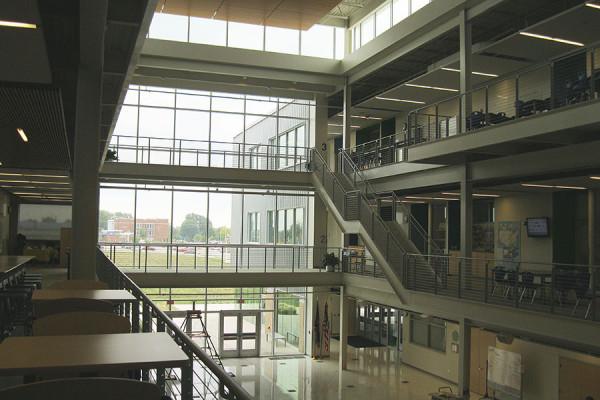Blue Valley CAPS provides opportunities to students
Professional environment of CAPS helps students get a different learning experience
The skylit roof allows the shining sun to come in, illuminating the Blue Valley CAPS building, home to teachers and students alike.
Located in the heart of the Blue Valley School district, the Center for Advanced Professional Studies is a place that offers multiple courses to students who want to get a more career-like experience before even reaching that stage of their life. Many of the course offered here provide more hands-on and vivid, real-life experiences.
The courses offered at CAPS are in the fields of bioscience, business and technology, engineering, and human services.
Senior Jake Lassman is a student in the Civil Engineering and Architecture course. He is taking the course for the first semester of his senior year and is really enjoying it.
“I get to spend a lot of time out in the profession. I’ll meet with people who actually have careers in engineering and work on projects with them,” Lassman said.
He travels to and from CAPS daily, leaving after his morning classes at high school to take a two and a half hour course at the CAPS building. He says the learning is a lot more hands-on and in depth.
“I wanted to iron out if I actually wanted to do it as a career. So that was the main reason I wanted to CAPS,” Lassman said.
New courses are being designed to add in to the CAPS curriculum, and Kelley Tuel is a developer of one of these, of many – the veterinary medicine class that will be available for students to enroll in next fall. She also helps out with courses in the bioscience strand, including molecular and environmental biology, in addition to organizing and sponsoring a district-wide BioClub that meets weekly.
She says that students get a lot more independence and opportunities in the CAPS setting.
“[For example] in the molecular class, the students do a lot of the preparation themselves … preparing the gel and dilutions [in labs].” Tuel says. “We’re more focused on skill.”
The major difference, she says, between high school and CAPS is that the latter is more industry-based learning, meaning that students get a lot more exposure to changing trends in careers that they want to pursue. CAPS changes and morphs depending on the demands and changes going on in the professional world.
Professionalism plays a big role in the environment and attitude at CAPS.
“We have professional dress, and 20 percent of everyone’s grade is professionalism, how they communicate to the teacher … and because they are going out and visiting with our business partners, we want to make sure they are behaving and conducting themselves professionally.” Tuel says.
Southwest science teacher Dianne Dunn has heard a lot about CAPS.
“They have options there that we can’t provide at the high school level,” she says.
However, she does believe it is important to establish a foundation with high school courses before taking CAPS.
“I think of it kind of as the icing on the cake, I don’t see it as a foundation for things.” Dunn says. “I think it’s more valuable for students to take once they’re maybe a 2nd semester junior or senior, once they’ve already gotten some of those really important classes out of the way.”
Dunn says it is important to take some of the valuable AP courses offered at the high school before jumping into CAPS courses. That way, she believes, they can get the most out of the more career-like experiences at CAPS.
Lassman pointed out the importance of a strong foundation as well.
“As long as you have the credits to graduate, [CAPS] is a great opportunity,” he says.
Balance, as Dunn and Lassman say, is important. This is a concern to sophomore Nicole Dudley who has been looking into taking CAPS in the future.
“It seems like a really great program and a great way for kids to explore interests, and it’s something I’m definitely considering because I know I want to be a doctor.” she says. “I’m not sure if I would have time in my schedule to do it yet.”
In addition to the independence and exposure to corporate jobs students get at CAPS, students get to work on projects with other firms or businesses that have joined with CAPS.
And as for freshman who are considering taking CAPS in the future, Tuel fully encourages them to try a course, as it gives them a real taste of what college and career will be like.
“It will be a really great and real taste to decide if that’s something they want to go into or not.”
The opportunities provided at CAPS are great in addition to high school courses. It’s a way for prepare better for college experiences as well. Tuel mentions that this attribute is another strong point of the CAPS curriculum.
“Students have real examples of projects they have successfully completed for an actual business…these give kids something real to talk about [on their transcripts],” Tuel says.
For more information on the CAPS program, faculty, courses, how you can enroll, and much more, visit the CAPS webpage


